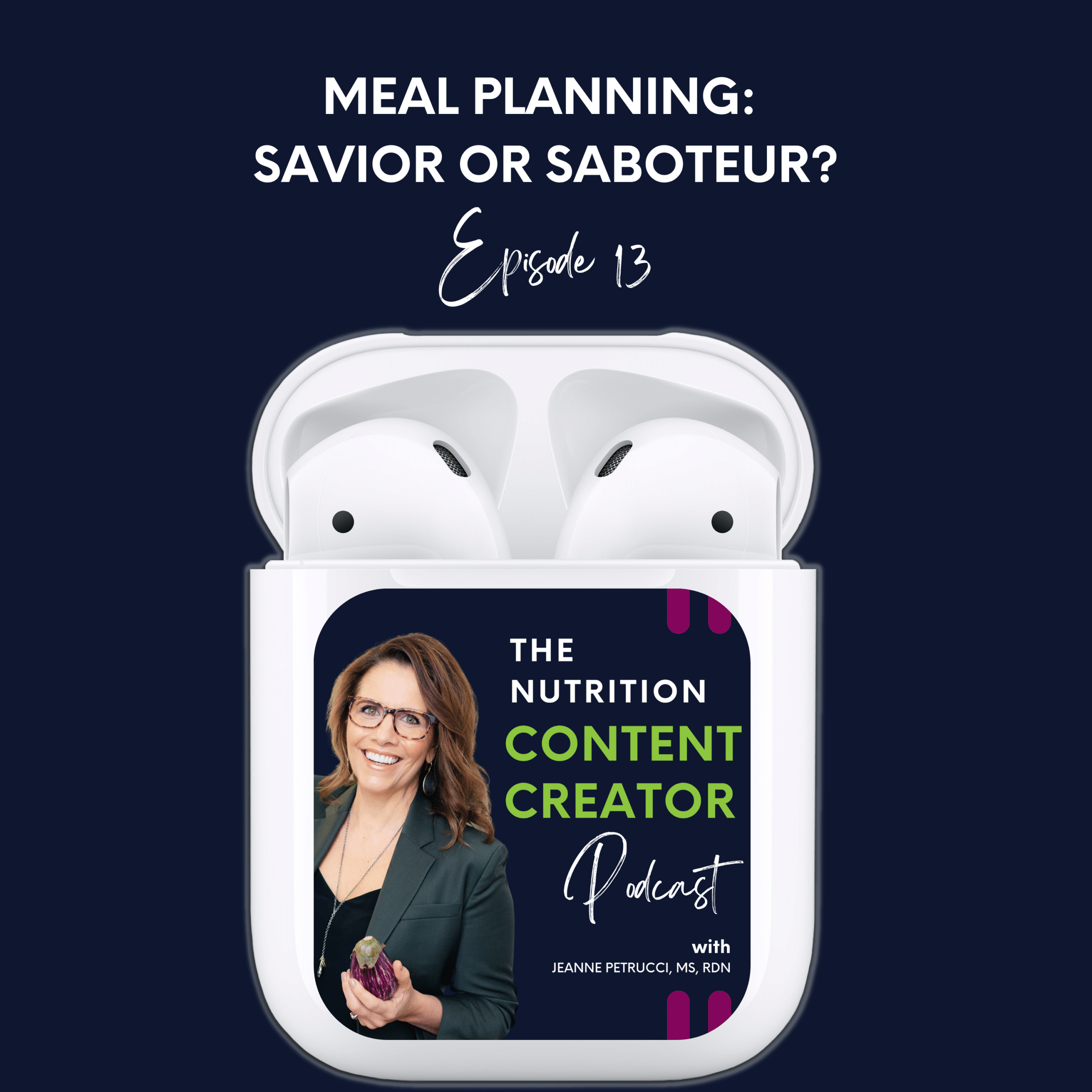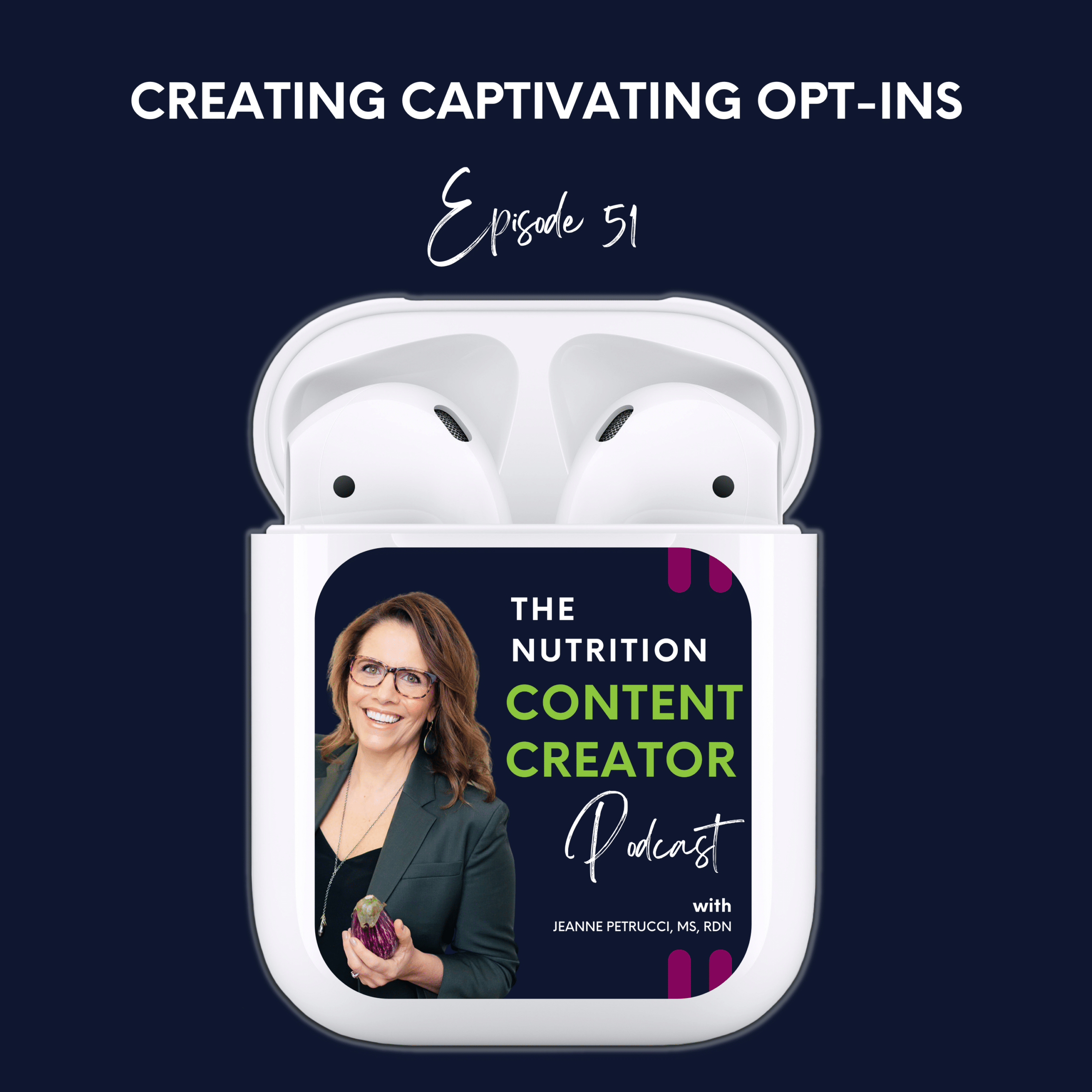13. Meal Planning: Savior or Saboteur?

As a relatively new dietitian of seven years, I am always surprised by how divisive meal plans are. When I first encountered this emotionally charged conversation surrounding meal plans, I was curious as to why they were so polarizing in the dietitian community. And then I started practicing, and it became crystal clear. This episode is not about how I was motivated to create a better meal-planning solution for practitioners. Instead, I want to explore the case for offering meal plans, from client, practitioner, and business perspectives. Meal plans have become a hot topic, often generating passionate debates among nutrition professionals. Some argue that they are too rigid and unrealistic, promoting a restrictive approach to eating. Others believe that they can be useful tools for providing structure, guidance, and accountability to clients seeking to improve their eating habits. As a dietitian, I found myself caught in the middle, questioning the merits and drawbacks of meal plans in my practice. In this episode, we will delve into the various perspectives surrounding meal plans, examining their value to clients, practitioners, and the business side of private practice. By exploring these different viewpoints, we hope to shed light on the complexities of meal planning and uncover a more nuanced understanding of its role in promoting healthy eating habits. So, let’s embark on this exploration together and navigate the world of meal plans.
We’ll cover:
- Meal plans in practice
- How meal plans add value to your practice
- Meal plans that resonate
- The meal plan paradox
“I don’t do meal plans.”
I get it. I was also frustrated, and the easiest thing to do would have been to not offer meal plans. But, as a culinary dietitian, I did not have this luxury. People were coming to me because I was a food-first practitioner so not offering meal plans would go against my mission of incorporating culinary instruction into the nutrition care process. Also, as a private practice owner, I knew that if I didn’t offer meal plans, clients would find them somewhere else. So not offering them would have been a poor business decision. Ultimately, meal planning can be a powerful resource for healthcare professionals to support their clients in navigating the often overwhelming landscape of nutrition and support them in achieving their health goals with food. The key lies in striking a balance – recognizing individual needs, and culinary competency, and fostering a healthy relationship with food. Also, accepting that no one follows a meal plan exactly can be an important shift in thinking. A meal plan should serve as a RESOURCE, not a mandate. View a meal plan as a space for having a conversation around food and its impact on health versus an “eat this and this will happen” approach. Now, before we continue, let me just say meal plans are not for everyone, especially those with a history of disordered eating. And they should always be used appropriately. Expecting anyone to “follow” a meal plan verbatim is not only unreasonable but it can also be defeated as it is almost always not sustainable.
Meal Plans in Practice
One concern that often arises is the fear that meal planning can lead to rigid dietary rules and restrictions. Critics argue that prescribing strict meal plans may contribute to an unhealthy relationship with food, promoting a mentality of “good” versus “bad” foods. This can potentially trigger disordered eating behaviors and diminish the intuitive relationship individuals have with their bodies and nourishment. In most cases, it’s not the meal plans that do the damage, it is their misuse by the practitioner. The lack of flexibility (as in PDF plans) and how they are used can significantly impact a client’s experience. Meal planning is not about imposing strict rules or dictating what individuals should eat. Instead, it serves as a roadmap, providing some structure, inspiration, and practical solutions for those who may struggle with meal preparation or lack knowledge about balanced nutrition. Customizable meal plans can serve as a dynamic resource for recipes that support your clients in meeting their health goals. Meal planning, when approached with a client-centered and holistic perspective, can be a valuable tool for support and guidance. The key lies in understanding the individual needs and preferences of each client. Personalized, customizable meal plans can take into account dietary restrictions, cultural background, and personal tastes, allowing clients to enjoy their meals while still meeting their health goals. A client-centered mindset is crucial – communicating with clients, creating a safe and non-judgmental space for discussions, and collaboratively developing meal plans that align with their goals and preference.
Meal Plans Add Value
Offering meal planning services sets your practice apart from competitors. It demonstrates your commitment to comprehensive care and goes beyond traditional healthcare approaches. By addressing the vital connection between nutrition and overall well-being, you’re offering a holistic solution that supports your clients on their journey toward optimal health. Adding customizable meal planning to your practice can support you in attracting new clients [as everyone is looking for a meal plan] and as well as nurturing loyalty among your existing client base. Here are five ways that meal planning can add value to your nutrition practice:
- Personalized Solutions: Offering meal planning services allows you to create personalized meal plans tailored to each client’s unique dietary needs, preferences, and goals. This individualized approach ensures that clients receive specific guidance and support, increasing their chances of successful adherence to their nutritional plans.
- Streamlined Meal Preparation: By providing clients with pre-planned meal ideas, recipes, and grocery lists, you simplify the process of meal preparation and save them time and effort. This convenience factor makes it easier for clients to make healthier choices and stick to their nutritional goals.
- Addressing Dietary Restrictions and Health Conditions: Meal planning enables you to accommodate dietary restrictions, food allergies, and specific health conditions. By offering tailored meal plans, you can guide managing conditions like diabetes, hypertension, or food sensitivities, ensuring your clients receive appropriate nutrition while enjoying a variety of flavorful meals.
- Comprehensive Care: Incorporating meal planning into your practice showcases your commitment to comprehensive care. It demonstrates that you understand the crucial link between nutrition and overall well-being. By addressing this aspect, you differentiate your practice and offer a holistic solution that supports clients on their journey to improved health.
- Continuity and Follow-Up: Meal planning opens up opportunities for ongoing engagement with clients. You can track their progress, make necessary adjustments, and provide continuous guidance and support. This fosters a strong client-practitioner relationship, increases client satisfaction, and encourages long-term commitment to their health goals.
Meal Plans That Resonate
Assess Kitchen Confidence: When creating meal plans, it’s essential to assess your clients’ level of kitchen confidence. Understanding their kitchen confidence allows you to tailor the meal plans accordingly.
- TIP: For clients with limited kitchen skills, focus on providing simple and easy-to-follow recipes. Offer guidance, cooking tips, and resources to build their kitchen confidence over time. Resources like no-cook recipes for breakfasts and snacks can move the needle for these clients. Cooking videos are also excellent as they support clients with visual guidance. Lastly, incorporating store-bought ingredients and convenience foods can be a real game-changer.
- TIP: For clients who are more experienced and adventurous in the kitchen, incorporate more complex recipes and culinary techniques to keep their interest and challenge their skills. But remember, even for someone with kitchen experience, the time and effort required need to be considered so ask them about what they would be comfortable with. Sheet pan dinners, soups, stews, and salads that require a bit more skill might be doable for them.
Provide Variety and Flexibility: Include a diverse range of ingredients, flavors, and cooking methods in your meal plans to ensure variety and prevent monotony. Encourage clients to explore new foods and experiment with different recipes. This not only keeps meals exciting but also provides a balanced nutritional intake.
- TIP: For a meal plan to be flexible, clients MUST be able to modify it. PDF and static meal plans, while great marketing tools, don’t make for sustainable changes in the kitchen. Why? Because they are not flexible – clients cannot make adjustments based on preferences and other considerations.
Seek client input and involvement in the meal planning process. Consider their food preferences, dietary goals, and any challenges they may face. By involving clients in the decision-making process, you empower them, foster a sense of ownership, and create meal plans that truly reflect their needs and desires.
- TIP: Setting goals using a meal plan as a resource is key to tracking progress and improving culinary skills. Here’s what it could look like: Including more fiber in your client’s diet is important for them to meet their health goals. A SMART goal might be: Make two overnight oats recipes from your meal plan this week. Follow-up, just like with any goal, is important here. Support them with simple recipes and maybe a video so they can feel confident about meeting their goal.
Account for Lifestyle: Even if you have a client with high culinary confidence, a busy schedule could derail their efforts to make recipes from a complicated meal plan. Recognize and address lifestyle constraints that may affect your clients’ meal choices. Consider time limitations, budget constraints, and food access when crafting meal plans. Provide practical recommendations, time-saving tips, and cost-effective options to help clients make healthy choices within their unique circumstances.
- TIP: If your client has a family and works a full-time job, is it reasonable to expect they will be making dinner 7 days per week? Probably not. Leave space in the meal plan and even drop notes suggesting take-out options that can support them in meeting their health goals without doing any cooking.
Set Realistic Expectations: Nothing is as defeating as receiving a meal plan that is LOADED with recipes. Sometimes we think we need to over-deliver and provide as many resources as possible, but this often backfires. I am asked frequently why our pre-populated meal plans only have 3-4 days filled in. This is why. Because, in practice, providing a 7-day plan will almost certainly overwhelm your clients. The benefit of using a flexible meal planner avoids anyone from feeling cheated out of more resources. Want more recipes in your meal plan? No problem. Just search, click, and drag.
- TIP: Consider the client’s current eating habits and gradually introduce changes rather than imposing a complete dietary overhaul. We all know the saying that “small changes over time have a big impact” and this is particularly true for nutrition. This approach increases the likelihood of long-term adherence and dietary intake changes that stick. So even if your client is looking for a fully populated meal plan, suggest they start with smaller changes and gradually increase meal planning activity as they are comfortable.
Consider Cultural Factors: Take into account factors such as cultural background and food preferences when designing meal plans. By incorporating foods that are familiar and culturally relevant, respecting dietary customs, and considering clients’ unique circumstances, you create meal plans that align with their needs and enhance their connection with the recommendations. If you are not familiar with a client’s dietary customs, ask questions. Only then will your client feel heard and respected and then you can move forward to craft a plan that is sensitive and realistic. There are foods in all cultures that can support clients in meeting their goals so instead of trying to transition them to a dietary pattern that doesn’t resonate with them, do your research and support them in a culturally sensitive way.
Meal Plan Paradox
Let’s revisit my early experiences with meal planning as a private practice dietitian.
Fact: Everyone wants a meal plan
Another Fact: No one follows a meal plan It’s not uncommon for individuals to express a strong desire for a meal plan, yet they struggle to follow it consistently. Let’s explore the psychological and practical reasons behind this paradox and uncover strategies to address these challenges.
Unrealistic Expectations: This is on you, not the client. If a client comes to you asking for a meal plan, simply giving them one loaded with recipes is not enough. You need to ask open-ended questions to elicit responses that can guide you to what type of meal plan, if any, is appropriate. Without question, your first question should be, “Why do you think you need a meal plan?” Your client’s responses will be a list of barriers to healthy eating that they think a meal plan will solve [and it may, but you need to explore this as other resources are likely needed]. Common responses I heard in practice: “I don’t know what to eat” “I have no cooking skills” “I can’t meet my health goals and cook for my family too” “I don’t have time to plan meals” “I don’t know what [insert nutrition prescription] food looks like” With this information, you can then move forward with creating and issuing an appropriate meal plan, or not. As mentioned earlier, meal plans are not appropriate for everyone, especially in the earlier stages of behavior change. Limited support systems can impact a client’s desire for a meal plan, especially if they received a diagnosis that is impacted by nutrition.
A typical scenario that plays out daily in private practice: The patient receives a diagnosis. The physician tells them to “improve their diet”. The patient is sent home [maybe] with a list of foods. This not only is not helpful, but it also creates unnecessary stress. And potentially more dangerously, it suggests that “if you eat these foods, this will happen.” Clients may come to you with a sense of urgency as they want to comply with the physician’s recommendations. They may think that a meal plan is the answer. The truth is that it probably is PART of the answer but does not provide the comprehensive support this type of client needs from you. The counseling process is critical for reducing client stress and giving them the support they need. Without the necessary support and accountability, it can be challenging to stay motivated and overcome obstacles. As healthcare professionals, we must provide ongoing support and guidance. Regular check-ins, accountability measures, and access to a supportive community [and yes, maybe a meal plan] can greatly increase the chances of success.
Your Content Cure for This Week
For this episode, we’ve put together a comprehensive Meal Planning in Practice Toolkit and content bundle. In it, you’ll find guidance for using meal plans as part of the nutrition care process as well as some resources you can use with clients, like a culinary confidence assessment tool. You can access this toolkit by clicking the link below in the show notes. Start exploring and let us know how you’re implementing these meal planning strategies into your practice.
>DOWNLOAD YOUR CONTENT BUNDLE HERE<<
Remember, meal planning is not about rigid rules but about providing guidance, support, and empowerment for clients to make sustainable choices that align with their goals, culture, and preferences. It’s also about creating opportunities for practice growth by supporting client attraction and retention.
Key Takeaway
Let’s summarize our conversation today about creating effective meal plans for your clients: Effective meal planning adds significant value to your nutrition practice by providing tangible solutions for clients who struggle with nutrition and meal preparation.
- Assessing clients’ kitchen confidence helps tailor meal plans to their skill level and comfort in the kitchen.
- Personalized meal plans tailored to each client’s unique needs, preferences, and goals enhance client satisfaction and increase adherence.
- Meal planning differentiates your practice from competitors and showcases your commitment to comprehensive care.
- The paradox of desiring a meal plan while struggling to follow one can be attributed to unrealistic expectations, lack of time or resources, and limited support systems.
- Creating meal plans that resonate with clients involves considering their cultural background, food preferences, and lifestyle constraints.
- Variety, flexibility, and realism are key elements in crafting engaging and effective meal plans.

Jeanne Petrucci MS RDN
Founder, Expert Nutrition Content Creator


